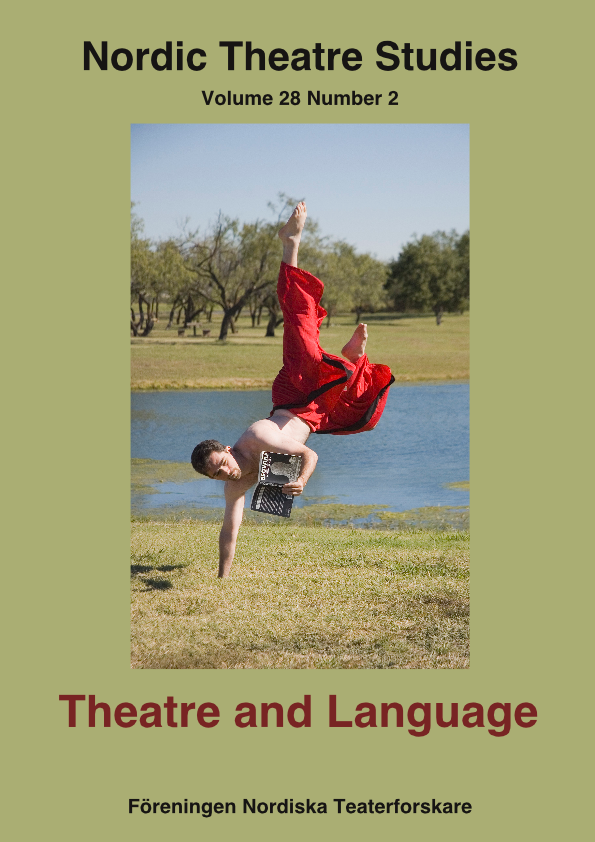Dancing with the Dragon: Orality and (body) language(s) in a live performance of Beowulf
DOI:
https://doi.org/10.7146/nts.v28i2.25534Keywords:
Beowulf, dance, ethnopaleography, Tsjêbbe Hettinga, Albertina SoepboerAbstract
This paper theorizes on the function of language and embodiment in northern European storytelling through a self-reflex analysis of the author’s experience performing Beowulf in its original dialect, as a solo, while dancing. Beowulf is Min Nama involved memorizing approximately 80 minutes of the medieval Beowulf epic in its original West Anglo-Saxon dialect (lines 2200—2766, Beowulf’s encounter with the dragon). Grappling with bardic verse for recitation in experimental live performance uncovered new facets in ancient performance texts. Working with the Beowulf poem for stage revealed the mnemonic quality of alliteration, the pervasive use of rhythmic patterns to signal shifts in ideas (a strategy similar to West African dance), and perhaps “deep rhythms” present in medieval northern Europe. As impetus for choreography, the verse contains rhythmic information, corresponding to musical/dance concepts such as pick-ups, counterpoint, and syncopation. Beowulf is Min Nama also required a theory of dialect for Old English, which the author based on modern Swedish, medieval Frisian, and modern Frisian — especially the voices of Frisian poets Tsjêbbe Hettinga and Albertina Soepboer. The project thus provides an entrée into the nexus between ancient and modern storytelling, and concludes that contemporary Frisian poetry represents a direct inheritor to ancient solo performance forms.References
Bagby, Benjamin. “Beowulf,” Beowulf, The Epic in Performance. www.bagbybeowulf.com (25.2.2016).
Bliss, Alan. 1958. The Metre of Beowulf. Oxford: Blackwell Publishers. Borrel, Daan. “De song als inspiratie” in De Groene Amsterdammer 21.1.2015.
Bragg, Lois. 1991. The Lyric Speakers of Old English Poetry. London and Toronto: Associated University Press.
Bright’s Old English Grammar & Reader, 3rd ed. 1971. Edited by Frederic G. Cassidy & Richard N. Ringler. Ft. Worth, TX: Holt, Rinehart and Winston, Inc.
Coles, John M. 1970. Experimental Archaeology. London: Academic Press. Conquergood, Dwight. 2002. “Performance Studies: Interventions and Radical Research.” TDR 42:2 (Summer), 145—56.
Council of Europe. “European Charter for Regional or Minority Languages.” European Treaty Series 148, Article 12 (“Cultural Activities”).
Ekkers, Remco. “de realiteit een kwartslag draaien.” Interview with Albertina Soepboer. http://home.planet.nl/~ekker036/albsoepboer.html accessed 7 February 2016.
Finnegan, Ruth. 2007. The Oral and Beyond: Doing Things with Words in Africa. Chicago: James Currey/University of Chicago Press.
Finnegan, Ruth. 1974. “How Oral is Oral Literature” in Bulletin of the School of Oriental and African Studies, University of London 37:1, 52—64.
Frank, Roberta. 1993. “The Search for the Anglo-Saxon Oral Poet” in Bulletin of the John Rylands University Library of Manchester 75, 11—36.
Gade, Kari Ellen. 1995. The Structure of Old Norse Dróttkvætt Poetry. Ithaca, NY and London: Cornell University Press.
Harris, Joseph. 2003. “‘Ethnopaleography’ and Recovered Performance: ‘The Problematic Witnesses to ‘Eddic Song’” in Western Folklore 62:1/2 (Winter-Spring), 97—117.
Hettinga, Tsjêbbe. “Strange Shores.” Poetry International Web.http://www.poetryinternationalweb.net/pi/site/poem/item/4584/poem_org_video_left/poem_english/0 accessed 7 February 2016).
Kalani & Ryan A. Carmara. 2006. World Rhythms! Arts Program Presents West African Drum & Dance: A Yankadi-Macrou Celebration. Van Nuys, CA: Alfred Publishing Co.
Kendall, Calvin. 1991. The Metrical Grammar of Beowulf. Cambridge, UK: Cambridge University Press.
Lakoff, George. 1987. Women, Fire, and Dangerous Things: What Categories Reveal about Mind. Chicago and London: The University of Chicago Press.
Lord, Albert Bates. 1960. The Singer of Tales. Cambridge, MA: Harvard University Press.
Mitchell, Bruce & Fred C. Robinson. 1996. A Guide to Old English. Oxford and Cambridge, MA: Blackwell.
Mouwden, Herbert. “Albertina Soepboer – Zone, De blauwe pijn” in Meander 13.1.2006.
Niles, John D. 2003. “The Myth of the Anglo-Saxon Oral Poet” in Western Folklore 62:1/2 (Winter-Spring), 7—61.
Opland, Jeff. 1980. Anglo-Saxon Oral Poetry: A Study of the Traditions. New Haven, CT and London: Yale University Press.
Parry, Milman.1928. L’Épithète tradionnelle dans Homère et Les Formules et la Métrique d’Homère. Paris: Société D'Éditions “Les Belles Lettres.”
Pope, John C. [1966] 1981. Seven Old English Poems. New York: W.W. Norton and Co.
Ross, Margaret Clunies. 2005. A History of Old Norse Poetry and Poetics. Cambridge, UK: D.S. Brewer.
Soepboer, Albertina. 2016. “I’ll Never be Your Maggie May” in Poetry Web International. http://www.poetryinternationalweb.net/pi/site/poem/item/4065/auto/0/ILL-NEVER-BE-YOUR-MAGGIE-MAY accessed 7 February 2016.
Stanley, Eric. 1991. “Dance, Dancers, and Dancing in Anglo-Saxon England” in Dance Research: The Journal of the Society for Dance Research 1991, 9:2 (Autumn), 18—31.
Taylor, Diana. 2003. The Archive and the Repertoire: Performing Cultural Memory in the Americas. Durham, NC: Duke University Press.
Tedlock, Dennis. 1983. The Spoken Word and the Work of Interpretation. Philadelphia: University of Pennsylvania Press.
Thornbury, Emily V. 2014. Becoming a Poet in Anglo-Saxon England. Cambridge, UK and New York: Cambridge University Press.
Watts, Ann Chalmers. 1969. The Lyre and the Harp: A Comparative Reconsideration of Oral Tradition in Homer and Old English Epic Poetry. New Haven, CT and London: Yale University Press.
Whorf, Benjamin. 1956. Benjamin Whorf, Language, Thought, and Reality: Selected Writings of Benjamin Lee Whorf. John B. Carroll (ed.), Cambridge, MA: MIT Press.
Downloads
Published
How to Cite
Issue
Section
License
The copyright belongs to the authors and Nordic Theatre Studies. Users can use, reuse and build upon the material published in the journal but only for non-commercial purposes. Users are allowed to link to the files, download the files, distribute the files on a local network (preferably by links), upload the files to local repositories if their institutions require them to do so, but not republish the files without proper agreements with the journal and the author.

